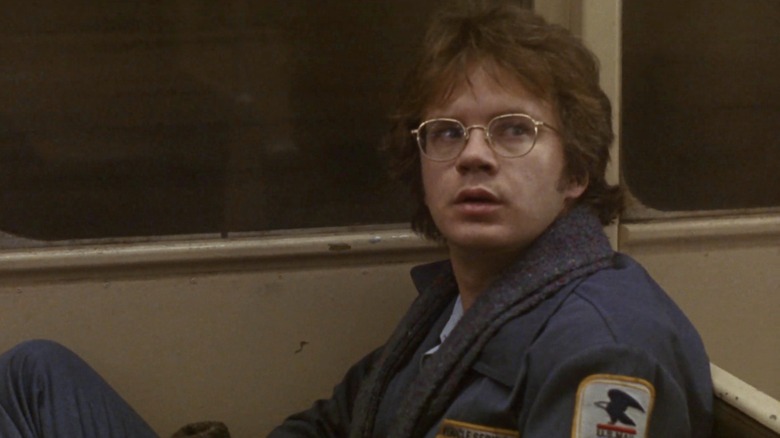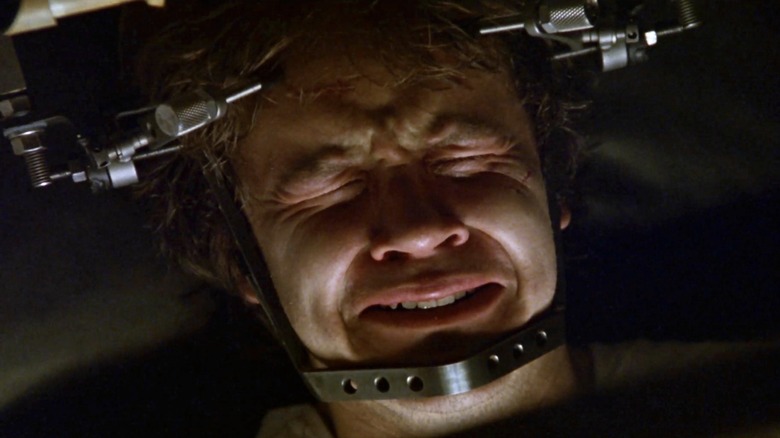Jacob's Ladder Went Out Of Its Way To Invent A New Vision Of Heaven And Hell
The original "Jacob's Ladder," written by Bruce Joel Rubin and directed by Adrien Lyne, conjures a vision of heaven and hell as hallucinatory experiences that seemingly overlap with living reality. Tim Robbins stars as Jacob Singer, a Vietnam veteran plagued by terrifying apparitions with no rational explanation. On the dance floor, for instance, he sees flashes of a scaly demon getting frisky with his girlfriend Jezebel (Elizabeth Peña), who bears a biblical name, just like him.
In one of the most famous parts of the movie, Jacob's kindly chiropractor, Louis (Danny Aiello), quotes the Christian mystic Meister Eckhart, telling him, "The only thing that burns in hell is the part of you that won't let go of life, your memories, your attachments." He adds, "If you're frightened of dying, and you're holding on, you'll see devils tearing your life away. But if you've made your peace, then the devils are really angels, freeing you from the earth."
Just how to portray heaven and hell —on earth — was at the forefront of Lyne's discussions with Rubin while "Jacob's Ladder" was under development. As the film was celebrating its 30th anniversary in 2020, Lyne spoke with Coming Soon, where he recalled:
"Literally we talked about the movie for a year and he had always seen it in sort of biblical terms. He'd always seen it in terms of heaven and hell as recognizable images, and I was much more interested in making... rather than hell being like pitchforks and people with clothed heels and heaven being sort of a magnificent staircase and pillars and clouds, like Liberace, I always just say I don't want to do the Liberace version. So I thought it was more interesting that home upstairs in your house is heaven, going upstairs."
'I also liked the horror side of it'
It's not until the end of the movie that Jacob makes it up the stairs in his house to heaven. First, he's got to go through a whole lot of hell...
When he wakes up on the subway at the beginning, Jacob sees a sign saying drugs can indeed make your life hell. Only later do we learn that he and the men in his army unit were dosed with a drug called the Ladder, becoming the victims of a chemical warfare experiment gone horribly awry. In talking about the movie's approach to hell, Lyne also referenced the drug thalidomide, a sedative that caused a crisis of birth defects in the 1950s and '60s. He continued:
"I also liked the idea of the horror side of it, the demonic side of [hell] being flesh-based. So almost thalidomide, so that it wasn't easily recognized, so that you couldn't dismiss it. Francis Bacon, I loved his pictures. They were just interesting because they're blurred and grotesque, but you can't quite see what's going on. You have to fill it in with your imagination, and I think that's much more interesting and frightening than seeing images that you've seen before."
The aforementioned dance floor scene is a good example of one where it's flesh-based yet hard to get a lock on anything visually other than a demon's tail moving between Elizabeth's legs. Images like this ensured that the hell and heaven of "Jacob's Ladder" would be one audiences never forgot.
1990 was a good year for Rubin; in addition to "Jacob's Ladder," he also penned the highest-grossing film of that year, "Ghost," and received an Oscar nomination for it. Lyne, meanwhile, returned to directing in 2022 with his first film in 20 years, "Deep Water."

